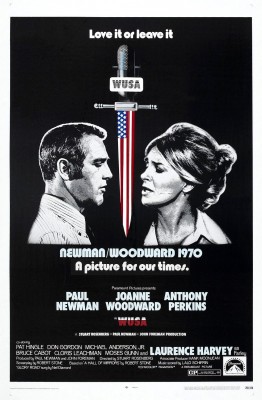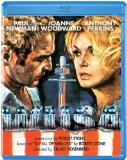| Reviews & Columns |
|
Reviews DVD TV on DVD Blu-ray 4K UHD International DVDs In Theaters Reviews by Studio Video Games Features Collector Series DVDs Easter Egg Database Interviews DVD Talk Radio Feature Articles Columns Anime Talk DVD Savant Horror DVDs The M.O.D. Squad Art House HD Talk Silent DVD
|
DVD Talk Forum |
|
|
| Resources |
|
DVD Price Search Customer Service #'s RCE Info Links |
|
Columns
|
|
|
WUSA
Olive Films, licensing the barely-released movie from a disinterested Paramount, offers a fine, basically flawless presentation of this Panavision production. No extra features.
Cynical, alcoholic drifter Rheinhardt (Paul Newman) arrives in New Orleans, stopping at a mission to collect an old debt from con man Farley (Laurence Harvey), now posing as a revivalist minister. Farley instead offers Rheinhardt a lead on a job, working for the ultra-conservative radio station WUSA. They are looking for an announcer with a knack for reading its presumably racist editorials. Station manager Noonan (Robert Quarry) hires Rheinhardt at once.
Meanwhile, Rheinhardt meets Geraldine (Joanne Woodward, Newman's wife), a woman adrift and turning tricks since her husband's suicide and a subsequent attack that has left her with a nasty facial scar. Virtually homeless and desperately hungry, she propositions a fat sailor (Clifton James) hoping to get a meal out of the arrangement. Rheinhardt comes to her rescue, and the two begin living together even though he's married, to someone, somewhere.
They rent an apartment in the French Quarter (a big studio set) where Rainey (Anthony Perkins), a well-meaning but naive liberal, has spent the last year taking welfare surveys. He's unaware that the surveys, ordered by WUSA's owner, Bingamon (Pat Hingle), are actually intended to intensify anger by whites against New Orleans' black population.
WUSA has lots of problems. The single biggest mistake the film makes is that WUSA's reactionary politics are always implied, never heard, the filmmakers perhaps believing it more powerful to leave WUSA's racism up to the viewers' imaginations. It's set in the American South in 1970, yet not once is the word "nigger" (or any other racial epithet) ever spoken, which is both unbelievable and inadvertently does the well-meaning film an injustice by avoiding it. Neither is "Democrat" or "Republican," the names of Civil Rights leaders, real political figures - nothing, nobody. It's all frustratingly just out of reach for the viewer. Paul Newman's Rheinhardt becomes a Bill O'Reilly-type fear-monger, a non-believer cynically doing his job purely for the money, yet what little copy Rheinhardt reads is absurdly vague ("And now for The Big Message," he says, "The future of America is up to you.") Newman's performance in these scenes doesn't help. Great film actor though he was, as a radio DJ Newman is singularly inauthentic, lacking anything like a smooth, radio delivery.
The movie is also overlong and overwritten. When Rheinhardt mercilessly taunts Rainey as a bleeding heart liberal, he replies that he's "Just trying to stay alive - and human." Given such terrible dialogue, Perkins falls back on that halting, skittish delivery that eventually got him typecast.
(Spoilers) The ending so shamelessly duplicates the climax of The Manchurian Candidate director John Frankenheimer and DP Lionel Lindon should have sued for plagiarism. At a "patriotic rally" one of the characters climbs into the rafters with the intent of political assassination, a sequence copied nearly shot-for-shot from the earlier, much superior film. Adding to this, bizarrely, is that in Frankenheimer's film Laurence Harvey, disguised as a priest, plays the assassin. In WUSA, Laurence Harvey, playing a con man wearing a clerical collar, is among those on the dais, in the assassin's sights.
Where less talented stars sometimes insist on playable likeable characters, Newman had the opposite problem, preferring libertines epitomized by Hud. He's so cynical in WUSA, from beginning to end, that not only is his character thoroughly unappealing, that there's no character arc, no progression or comprehension also makes Rheinhardt completely uninteresting as well. There's a conspiracy and he does nothing.
Despite everything, certain aspects of WUSA are very well done. The location photography of New Orleans, possibly inspired by Easy Rider released the year before, captures the city well, with an attractive (if unblinking) semi-documentary look, such as one beautiful shot at night of neon lights reflected on wet pavement.
Joanne Woodward is excellent playing a desperate character inadequately cared for by Rheinhardt, who has bigger fish to fry. Cloris Leachman and Don Gordon, among others, are good in small but significant supporting parts. The Preservation Hall Jazz Band also puts in a brief but memorable appearance.
Video & Audio
Filmed in 2.35:1 Panavision, WUSA looks great in this flawless transfer. It's particularly interesting to see New Orleans, mostly deglamorized, as it appeared 43 years ago. The mono audio, English only with no subtitle options, is also fine. No Extra Features.
Parting Thoughts
Definitely worth seeing once as a passionately sincere but failed effort, one that inelegantly captures the political and social frustrations of its era, WUSA is shrill but certainly interesting. That and its excellent video presentation make this Recommended.
* He was certainly aware of the film whose title is clearly intended to remind viewers of Altman's then-current MASH.
Stuart Galbraith IV is a Kyoto-based film historian whose work includes film history books, DVD and Blu-ray audio commentaries and special features. Visit Stuart's Cine Blogarama here.
|
| Popular Reviews |
| Sponsored Links |
|
|
| Sponsored Links |
|
|
| Release List | Reviews | Shop | Newsletter | Forum | DVD Giveaways | Blu-Ray | Advertise |
|
Copyright 2024 DVDTalk.com All Rights Reserved. Legal Info, Privacy Policy, Terms of Use,
Manage Preferences,
Your Privacy Choices | |||||||
















